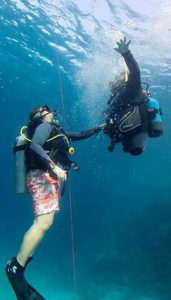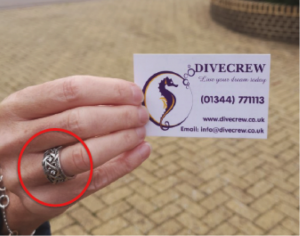When training, most divers will happily throw their regulator away underwater, but are not happy to flood and clear a mask. It never ceases to amaze me how the one thing keeping the diver alive underwater matters less to them, than their mask.
So what’s the best agency for mask skills? BSAC, SSI, PADI or RAID. Well in my view none of them and all of them. When we teach instructors for Deptherapy we look at the ‘Standards’ for the skill. So what is the standard and what is just technique? When we work with injured troops, some cannot do Giant Stride (they have no legs). The standards state, ‘Deep water entry’. It does not state giant stride. So what is the best entry into the water for a diver? The easiest!.
Where instructors insist on mask clearing performed in a certain way, criticising or correcting a student because they have not performed the skill in the exact way an instructor has, this is just simply wrong. Yes the student should meet the standard of clearing a mask, but some of my students have one hand! I have two.
Sadly a lot of agencies turn out mini me’s and or sheep. Students are not homogenous. They are all different. In my humble opinion, no agency teaches enough main stream instructors about the psychology of diving. No agency spends enough time on what a standard is and what is just technique.
Sometimes with students they prefer to offer the mask to the face, clear it, then put the strap on. Some prefer to pull the skirt away at the bottom, some put pressure on the top of the mask. Some look to the surface to clear a mask some do not. The point is, can they comfortably clear a mask, with repetition and mastery?
 students often have the masks just too tight, making the skill difficult if removing a mask and then replacing it. They struggle to replace the strap over their head, pull the mask to their face in an attempt to do so, forcing water up the nose. Divers with long hair find the silicon strap grabs the hair. Simple solution is a slap band.
students often have the masks just too tight, making the skill difficult if removing a mask and then replacing it. They struggle to replace the strap over their head, pull the mask to their face in an attempt to do so, forcing water up the nose. Divers with long hair find the silicon strap grabs the hair. Simple solution is a slap band.
Deptherapy teaches instructors that they are not God’s, they do not have all the answers by some magical divine right from attending an Instructor Examination. Most instructors I see working with the physically challenged are not physically challenged themselves. So one cannot put themselves in that students place. When we teach at Divecrew and or Deptherapy, we state the standard/objective required and speak with the student on how do they think they can achieve it. Most amputees can perform incredible feats as they have had years of adjustment. Bi-lateral amputees generally have incredible upper body strength. Never under estimate the student before you. Over the years we have built up a lot of knowledge and techniques which can easily be transferred to the physically sound student but who is very nervous or even frightened about the mask skill. So two things. If a student does it slightly different to the instructor demonstration but has cleared the mask, success. Second, do not reinforce failure. A struggling student just told do it again. do it again, do it again, is going to be defeated. Try a remedial, if that does not work move onto a another skill. When the student succeeds make a fuss of them. Build their confidence and self esteem. Come back to the mask later.
I remember an instructor who was made to look a complete fool by one arm Dan, when the instructor could not perform the mask skill demonstration one handed and Dan helped him recover his mask and refit is. Dan then demonstrated how to do the mask skill one handed. Dan was unusual in that his injury was a through the shoulder amputation. However, at the time I was working with him his professional job was a Chauffeur and he could tie his neck tie one handed. Next time you are bored, try that one. Dan also showed the instructor how to remove and replace his BCD underwater with one arm and wearing a shoulder prosthetic.
So for a bit of fun. Riddle me this. When I was a rookie instructor, I was working in Slough Pool on an Open Water Confined Session. There were a couple of us teaching six students. The student I got was asked to flood and clear his mask. With close control I watched. He was very calm, he cleared his mask completely no problem. However, I was mystified as I could not see bubbles coming from the nose pocket? So, I asked him to repeat the skill. He did just as before, calm and complete clear. Still not knowing how he has done this, I asked him to repeat the skill once again. He immediately signalled up he wanted to chat. We went to the surface. I asked if he was alright. He said, “Yes, but I cannot snort any more water!” Did he meet the standard? Answers on a post card.

 At Divecrew we try not to teach divers as a homogenous group. Everyone is different. So how did we get to the this point? Well first thing is we challenge some agencies as they tend to turn our “sheep” instructors. Instructors being professional should use a range of skills and techniques so that every diver student can be taught in comfort and safety. Working with Deptherapy and injured troops heightened our senses to the individual needs of the divers. The “sheep” mentality is challenged as to what is a technique and what is a standard. For example many instructors talk of a giant stride as a deep water entry. So what is the best entry for a student? The easiest! Simple. The standards state a deep water entry not a giant stride.
At Divecrew we try not to teach divers as a homogenous group. Everyone is different. So how did we get to the this point? Well first thing is we challenge some agencies as they tend to turn our “sheep” instructors. Instructors being professional should use a range of skills and techniques so that every diver student can be taught in comfort and safety. Working with Deptherapy and injured troops heightened our senses to the individual needs of the divers. The “sheep” mentality is challenged as to what is a technique and what is a standard. For example many instructors talk of a giant stride as a deep water entry. So what is the best entry for a student? The easiest! Simple. The standards state a deep water entry not a giant stride. students often have the masks just too tight, making the skill difficult if removing a mask and then replacing it. They struggle to replace the strap over their head, pull the mask to their face in an attempt to do so, forcing water up the nose. Divers with long hair find the silicon strap grabs the hair. Simple solution is a slap band.
students often have the masks just too tight, making the skill difficult if removing a mask and then replacing it. They struggle to replace the strap over their head, pull the mask to their face in an attempt to do so, forcing water up the nose. Divers with long hair find the silicon strap grabs the hair. Simple solution is a slap band.